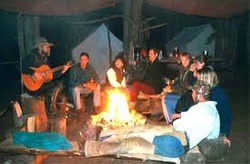
Here’s the full list of “traps” that we have encountered. Over the next week or so, in three entries, I’ll feature a different set of these traps:
o Let’s Get Comfortable
o Let’s Put On a Show!
o We’re Not Ready
o Oh, That’s Their Problem
o We Need a New Organization
o We Need to Collaborate More
o Data First
o Money First
o What If We Get It Wrong?
o But What Are We Going to Do?
Let’s Get Comfortable
Working differently isn’t easy because it isn’t what we’re used to doing. Whenever community groups meet, they must be constantly on alert not to let discomfort pull them away from the new approach. This is especially a risk with people who are joining the effort mid-stream and may try to devolve the conversation back into an approach with which they are comfortable. You want folks to join the process continually, BUT be sure to orient newcomers appropriately [see earlier blog posting on “Seven Habits of Highly Effective Communities” for more detail on this concept of on-going orientation], and designate participants in each meeting to be the watchdogs or guards who will point out when the conversation is falling back on old, bad habits.
If every other community meeting your members are likely to attend, is focused on the old way of thinking about problems – single-sector activities, scarcity, ideology, blame – it is no surprise that there is a natural inertia in that direction and away from the more successful outcome focus of Working Differently. We’ve seen where communities have posted their “values” and “method of operation” or take a few minutes at the beginning of each meeting reminding folks that this is a different way of working. (See upcoming “Tools” posts for examples.)
This is also a real value provided by the community support organization or backbone organization [see earlier blog posting on "Creating the New There." for more detail on this concept of someplace in the community having a catalytic focus on the end result -- the community outcome].
Another derivative of this trap is a long-drawn out process of TRUST Building. We’ve seen some efforts derailed for years while some well-meaning funder pays for trust building exercises. (And most consultants are more than willing to prescribe this easy source of consultant-billing). We have yet to see where this artificial trust is maintained in the face of the hard decisions required to develop a shared definition of the outcome and a meaningful measure. At best, they are the community equivalent of gathering around the campfire to sing "Kumbaya." (It's perhaps pleasant once a year, but would be mind-numbing as a sole activity.) Success comes from jumping right into the central question – what outcome do we want? – and build trust around acting and not falsely around preparing to act.
Let’s Put On a Show!
When we aren’t sure what to do, we can easily fall back on familiar strategies like creating a new program, hosting a conference, holding a fundraiser. But we shouldn’t propose any actions until we know what the outcomes are, and then we should test those actions to measure if they are, in fact, getting us to those outcomes. When we are ready to decide how to reach the outcomes, we should begin with what we already know is working, rather than grasping at new ideas just because they are new. Achieve results from respecting and aligning the work of the community, not covering over the old system with one more layer of programs. (We'll cover this more fully in future posts.)
We’re Not Ready
Even when we are inspired by the idea of working differently, it may feel like too much, too fast for some communities. Or certain organizations perceived to be critical to success may not feel ready to participate. But if we aren’t ready now – when our kids and elders need help, when families are in distress, when our environment is degrading – when will we be ready? Don’t get held up because some people won’t get engaged right away; some folks won’t take time to get involved until you have some actions to show them. As we talk about in the earlier “Seven Habits” post, make sure there is always an empty chair at your working differently community meetings for whenever folks are ready to join, BUT we don’t have the luxury to wait. Get moving. NOW! [link to Habit #2 from the blog post: Seven Habits of Highly Effective Communities.]
To be tweeted links to my new posts -- blog, book reviews (both nonfiction and fiction), data or other recommended tools -- either go to Twitter.com and follow me @jcrubicon, or just go to my Home page and click on the Twitter button on the right, just above the tweet stream, and follow me @jcrubicon.
 RSS Feed
RSS Feed
